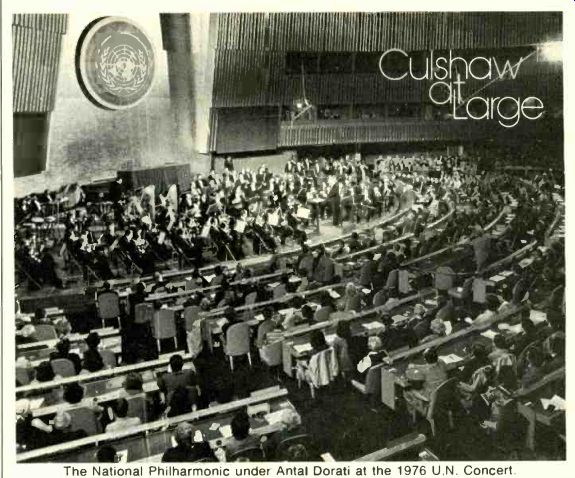
above: The National Philharmonic under Antal Dorati at the 1976 U.N. Concert.
The 1976 U.N. Day Concerts
by John Culshaw
NEW YORK--For the past three years, on October 24, I have had the honor of directing the televising of the United Nations Day concert. It is an exhilarating and exceedingly frightening experience, never to be contemplated by those who are frail of heart or weak of knee. For one thing, it is live, which means that any mistake you make will be displayed to the world; and it is "live -deferred," which is a way of get ting rid of the awkward thirty-minute intermission.
The 1976 concert began precisely at 3:00 on that Sunday afternoon, but transmission did not begin until 3:30, a process that involves the hitching up and re-spooling of several video machines. The effect in real time is uncanny, because at 3:32 there I was directing the cameras for Marian Anderson in Copland's Lincoln Portrait while on the transmission monitor Antal Dorati was just starting Beethoven's Egmont Overture, which had taken place exactly thirty-one minutes earlier. The result of this deliberate time lag is that by the time you reach the second half of the con cert-in this case, Lazar Berman playing the Tchaikovsky B flat minor Concerto--you have caught up with the clock and have become genuinely, irrevocably live. It can all be very confusing.
There are other confusions, too, at least for someone who works for the U.N. only once a year, and the first is finding your way about the building.
The trouble is that it is not one building, as it appears on a postcard, but hundreds if not thousands of buildings, all connected by elevators and escalators designed to take you where you do not want to go. You have also to learn never to take as much as a step without carrying your pass be cause, although it is easy to go from a restricted to an unrestricted area, it is almost impossible to get back again without that vital piece of paper.
In 1974, when the concert was given by the New Japan Philharmonic with Seiji Ozawa, the second half of the program nearly went on the air with out a director because I had un wittingly gone to a restroom in an un restricted area during intermission and had left my pass in the control room. The guards correctly and politely stopped me. Their apprehensions about a jacketless Englishman trying to gain entry were doubtless doubled when I explained that within four minutes I was going to "shoot" Secretary-General Kurt Waldheim, whose speech was about to begin. But instead of locking me up or putting me on another escalator to nowhere, they kindly guided me back to the control room and stayed to listen to the speech.
Such problems are minor indeed compared with the situation that arose while we were preparing for the 1975 concert to be performed by the Vienna Symphony under Carlo Maria Giulini. The main work was a new cantata by Gottfried von Einem called An die Nachgeborenen (To Posterity), and it involved Julia Hamari, Dietrich Fischer-Dieskau, and the Temple University Choirs. A journalist noticed that in the last movement of the cantata--a setting of Psalm 121--Einem had omitted a line that reads: "Behold, He that keepeth watch over Israel shall neither slumber nor sleep." Now I don't know about those who keep watch over Israel, but from that moment onward there was not much slumber or sleep for any of us.
It is not hard to imagine the various sensitivities aroused by the omission, and Einem did not help matters by claiming, during an interview with The New York Times, that he had worked from an ancient, authenticated text that excluded the line. This brought down upon his head a veritable deluge of theological denials, at which point he refused to give any more interviews.
By that time various factions for various reasons were threatening to boycott the concert. Giulini tried without success to persuade Einem to set the line. Then someone suggested a fermata during which Fischer Dieskau might speak the line-a seemingly ingenious solution until it was pointed out that it would provide an even greater emphasis than the omission. In the event it was left out, and I don't think anybody missed it; but I'm told that in the DG recording made shortly afterward in Vienna, which I have not heard, it has mysteriously appeared. Perhaps Einem wrote mu sic for it in during the long flight home.
There were no such incidents in 1976, but I have just been told in confidence what may await me in 1977. It's very exciting, and I wish I could disclose it, but I can't. Yet, being a journalist rather than a diplomat, I can't resist revealing one closely kept inter national secret: The bartender in the U.N. Delegates Lounge makes the best Bloody Mary in the world.
-------------
(High Fidelity, Apr. 1977)
Also see:
Link | --Link | --The New Releases--The Perilous Path to Soprano Superstardom; Heroic Voices from Pioneer Days
Link |